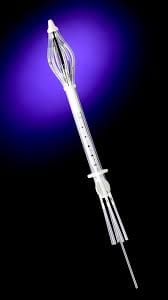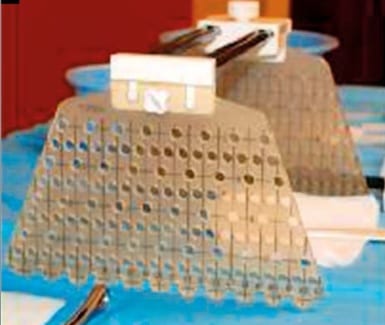Breast Brachytherapy
Accelerated Partial Breast Irradiation
Treatment Regimen
Deliver 32-34Gy over 4-5 days BID (two treatments daily separated by at least 6 hours).
PTV is typically taken to a 1-2cm expansion of the lumpectomy cavity. Any portion of the PTV that extends to the ribs or skin are likely to be subtracted.
Intracavitary Breast Brachytherapy
Clinical Use
Intracavitary breast brachytherapy is commonly used to treat the surgical bed post resection of a hard tumor. Intracavitary applicators are best suited treatment of a tumor bed that is located at least 5mm (preferably deeper) from the skin surface.
The applicator will be inserted during surgery and left within the resection cavity for treatment. Once treatment is complete, the applicator is emptied of fluid (balloons) or adjusted to smallest diameter (SAVI) and removed from the breast.
Applicators
Strut Adjusted Volume Implant (SAVI)
The SAVI applicator features multiple treatment channels and can be expanded to different diameters using a strut system. The number of channels allows for control over the dose distribution but the design places channels in direct contact with tissue increasing local hot spots.
Intracavitary balloons
Intracavitary balloons (MammoSite, Best Balloon, etc) feature a saline inflatable balloon with 1 or more channels available for treatment. Balloons are available in a number of sizes and can have their size adjusted by changing the volume of saline within the balloon.The multi-channel balloons allow for some tailoring of the dose distrubution around the balloon but care must be taken to avoid rotation of the applicator.
Interstitial Breast Brachytherapy
Interstitial breast treatments use needles inserted through the breast to treat non-resected or irregular volumes that could not be treated with an intracavitary approach.
Breast compression and a template are used to assist in needle placement with the patient under local or general anesthesia.
Navigation
Not a Premium Member?
Sign up today to get access to hundreds of ABR style practice questions.



